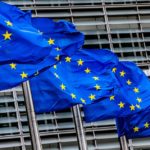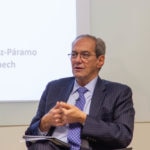"Europe plays a relevant role in defense of free trade"
The world has recently taken a turn toward trade protectionism. Given this situation, at a forum in Madrid, BBVA Executive Board Member José Manuel González-Páramo proposed committing to multilateralism through the World Trade Organization. He expects “Europe to play a relevant role” in this movement. These efforts are essential, he maintained, because protectionism threatens global growth.

The EOI Business School invited BBVA Executive Board Member José Manuel González-Páramo and former Minister of Foreign Affairs Ana Palacio to discuss “Trump protectionism and its effects”. The debate was moderated by Rafael Doménech, Head of Economic Analysis at BBVA.
BBVA’s Executive Board Member stressed the critical situation of international trade due to countries like the U.S. calling it into question. However, this was not always the case. In the 20th Century, trade integration played a decisive role in the economic growth of advanced economies.
However, since the start of the 2000s, an increase in protectionism can be observed, following the rise of populist anti-globalization movements that express the discontent of some workers impacted by globalization and the technological transformation underway.

BBVA Executive Board Member José Manuel González-Páramo - EOI
A shift in the U.S. trade policy
Regarding the U.S., José Manuel González-Páramo analyzed several factors. First, its shift toward protectionism, which began prior to Donald Trump’s presidency, but intensified with the new administration’s desire to reduce the country’s trade deficits. In fact, in his first year, Trump focused on re-negotiating the trade agreement with the countries of North America, NAFTA. This eventually led to a new treaty - the United States - Mexico - Canada Agreement (USMCA), which significantly reduces uncertainty. In his second year, he focused more on China, and recently, on Europe.
Second, in the opinion of BBVA’s Executive Board Member, the U.S. Administration’s economic diagnosis of free trade is erroneous and is influenced by ideological motives. It’s the wrong point of departure for two reasons, he explained. First, for establishing the bilateral trade balance as an economic policy objective; and second, for attempting to keep jobs that are not economically efficient instead of improving workers’ employability.
Third, José Manuel González-Páramo analyzed the effects of the Trump Administration’s trade policy, and especially, the consequences of a possible trade war with China. Despite the current truce, BBVA’s Executive Member of the Board maintained that “an escalated trade war cannot be ruled out” between both countries.
This possible trade war would impact trade, as well as confidence in financial markets - especially for China and emerging economies; and would also have a long-term impact on production and value chains. It’s a situation in which everyone loses, he said.

From left to right: former Minister of Foreign Affairs Ana Palacio; Rafael Doménech, Head of Economic Analysis at BBVA; and BBVA Executive Board Member José Manuel González-Páramo - EOI
Europe and challenges of the international trade
Asked by Rafael Doménech about Trump’s impact on transatlantic relations between the U.S. and Europe, José Manuel González-Páramo stressed the importance of the commercial ties between both blocs. However, the strength of this axis has been affected by things like Brexit and the growing influence of the Asia-Pacific region. This makes it all the more essential to recover the possible trade agreement between the EU and the U.S.
When taking questions, BBVA’s Executive Member of the Board also referred to the importance of global trade for the EU economy. Europe should build bridges, he affirmed. In fact, the EU is working on expanding its current trade relations with countries like Canada, Japan, Singapore and Vietnam. And it’s strengthening ties with Mercosur, creating a new circle of friends that share the same values.